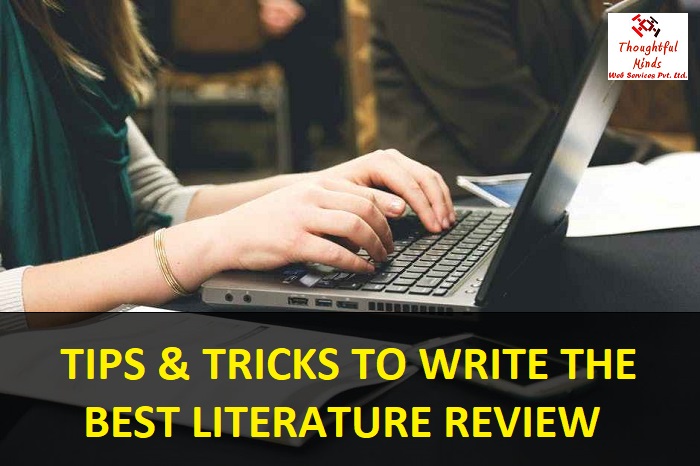We occasionally come across literature reviews in some of the prestigious research journals and wonder; what made this review worth publishing? Can we also pen down a literature review that can be worth publishing for millions of subscribers reading the journal across the world? Well, the knowledge about the subject and the plethora of research conducted in the backdrop is certainly unparalleled, but the secret of successful publication is surely more than that.
GET HELP INSTANTLY
Place your order to get best assignment help
(since 2006)
A piece of literature review is a guiding concept, and it functions over a set of rules that convey the readers the knowledge and ideas that we have established on the topic. We should remain unbiased about both the strengths and weaknesses presented on the topic. The guiding concept ought to precisely feature our research objective, the issue or problem of discussion, or our argumentative thesis. It is not merely about the descriptive list of materials accessible, or rather a set of summaries. It is something more than that and here we are going to discuss about the same.
Introduction
The prima-facie objective of a literature review is to seek concrete and meaningful information by scanning the nuts and bolts of the concerned literature draft in an effective sense. It can be done with the help of a user manual, computerized methods to recognise a set of fruitful books and articles. Subsequently, we are required to put forth a critical appraisal of the concerned piece of work by applying the fundamental principles of analysis. It helps us to stay unbiased and propose a valid study for the future scholars to come.
Our literature review ought to be productive enough to organize around and link directly to the research question or thesis that we are developing. It should be proficient enough to synthesize the results into a summary of what is known and what is unknown. It should help us to tap the grey areas of controversy in the concerned piece of literature and formulate the questions that demand additional research.
The publication of a literature review always come along with a stiff deadline and does not provide the luxury of sitting around and think too much. That is the point where literature review help from a credible research and thesis help agency can help to get the job done with the help of a professional intervention to leave no scope for error whatsoever. Here, we are not only going to shed some light over the most effective literature review writing tips to help us self-serve our needs but also about a professional alternative to attend our needs at the time of crisis.
So, where it All Begins?
Once we have decided on a particular area or a topic of research, we are required to formulate a research question on the same. As the question has been successfully framed, it is the time to review the literature on the concerned topic. A literature review is basically a critical summary of all the previously published works on the given topic. The key hallmark of a successful literature review is its comprehensive nature in the field of research and publication.
In a recent point of discussion that took place between Science Careers and several scientists lead to an interesting theory about the presence and role of literature in the field. They got several interesting responses in the same regard. One such response stated by Dr. Denis Bauer stated that, “staying up to date with the prevailing aspects of literature is probably the single most critical asset that remains indispensable across the career of a researcher. Without becoming familiar with the current gaps, your findings will either be an old hat or left out for too much time in the field to be put on right away.”
A literature review is an indispensable part of any scientific manuscript meant for journal publication. The primary motto of a comprehensive literature review is to showcase and convince the journal editor that we have done our part of research and are aware of the existing research in our field. Yes, there are times, when we may come across a dearth of journal articles to take the reference for the publication of our research. But this misconception cannot be more far from reality! Believe it or not, but the global research output skyrockets every year by around 2.5 million newly published journal articles. Indeed, there is a possibility that we might not have a direct access to it and might require to take professional assistance of those who do have the same. That is where we can take reasonably priced assistance from an agency specialised in offering literature review writing help to the scholars, researchers, and reviewers.
If the problem is not associated with availability, then what can be the prominent reason stopping us from finding relevant literature? Is there a possibility of the fact that the strategies that we are searching are navigating in the wrong direction? Or are they simply insufficient? It is not necessary for us to have a long list of references at the end of our manuscript. However, while conducting the research, our literature ought to present a view of the field of research as presently it is. So, what shall we do in case we fail to find relevant studies in our research area? Let us find out!
Wish to make your review paper an eye-candy for top research journals in the world? Read the below link to sophisticate your skills to the pinnacle of discernment.
 MUST READ: How to Write a Review Paper Entitled for Appreciation by the Best of the Reviewers Worldwide?
MUST READ: How to Write a Review Paper Entitled for Appreciation by the Best of the Reviewers Worldwide?
The Tips to Broaden Our Horizons of Literature Review Writing
We Need to Broaden Our Search Area
We might have been thinking about our research question for several days, or maybe weeks. So, there is always a possibility that our thinking might become too constricted. We might have demarcated tight mental borders around our research question. Due to the same reason, we might not be able to envision other research areas that might turn out to be pertinent for our paper, even if they do not link directly.
For instance, let us take a hypothesis that our research question revolves around the study whether a specific form of plastic can be made compostable or not. Now, after exploring deep over the Internet, we have only secured two papers related to the topic. Now, how shall we react? Positively of course, as we are at an advantage! Our research can fill a massive gap in this area and can add more value through our contribution.
When we broaden our search area, we might come across pertinent literature to successfully back the hypothetical question raised above. For example, we should explore the processes that can make plastic biodegradable. It will surely provide a better foundation to our research to develop new dimensions of knowledge and understanding. To kickstart the research, we can look for the forms of plastics that are conducive to the environment, like bioplastics. These are made from natural ingredients such as corn starch. It will not only broaden the relevance of the question within the conceptual framework, but also vindicate the contribution of our research.
The Application of Right Keywords
Finding trouble to find the most relevant sources of information? It can be probably due to the usage of irrelevant or unrelated keywords. The keywords are always expected to be well targeted to the research papers that we are looking for. Once we have the research question, it is the time to frame keywords for each concept.
For example, if our area of research is associated with childhood schizophrenia, then certain keywords that we can utilise would include “schizophrenia,” “schizophrenia in children,” “early onset schizophrenia,” or “early symptoms of schizophrenia.” The change in the order of the keyword might result in the extraction of totally different results. For example, while exploring the search engine with the keywords “schizophrenia symptoms in children” will actually give us different results in comparison to the keywords “childhood schizophrenia symptoms”.
If we are facing trouble to make appropriate usage of the keywords, then it is the time to assign the task to those who are an optimum choice for the given role. Hire literature review writing services from an assignment writing agency that can deliver trusted results without a blink of hesitation.
In-depth Exploration of Relevant Articles
If there are limited number of references, then it might turn the table in our favour. If we are having a short list of articles, then we can invest more time, energy, and resources to explore them in detail. Besides, if there are confined number of sources in our specific area of research, then it is feasible that several fundamental questions have not been addressed or answered yet. If that is the case, then we could face limitations in the existing portion of literature and utilise them to build or raise our own research question.
Follow the Citations Carefully
Citations basically navigates the reader to prior rational research in a particular field. By acknowledging a citation or a reference, we are accepting the fact that sources of other articles have been used. The citations of an article can either be followed via forward searching or backward searching. The inclusion of reference sources would not only boost the credibility of our publication tenfold, but also prevent the accusation of plagiarism from the actual owner of the source material in the future.
It is interesting to know that forward citation search is primarily responsible to search all the articles that respectively cite back to a particular article. On the other hand, the practice of backward citation search would help us find all the cited references right within a single piece of article. This form of search appears backwards in time to observe what led to the article we start.
Here, what is essential to keep in mind is that the referencing style shall be used after thorough discussion with the publisher. For the research journals, a specific form of citation style is employed globally, and the review is submitted in that format only. To make the whole piece of referencing flawless, never hesitate to take the help from a professional assignment editor.
Never Hesitate to Seek Help
Seeking professional help from an authorised and right source is 100% legitimate and recommended. We can start from the library and ask whether they have the subscription of the scientific and research journals that we seek. If we can find certain journals that can allure our attention, then we can track the publication and recognise the name of the journal that offered space to it. If there is a senior colleague, a supervisor or a professor who can help us out with their knowledge and experience then it is well and good. If they have successfully wrote and published a few literature reviews in the past, then there is a great possibility that they have gone through a similar plight which we are currently facing. They have surely honed up a few tricks under their sleeve and would be more than glad to help us in the same regard.
Additionally, we can explore some of the credible researcher groups and forums like Quora, Mendeley or ResearchGate, that are dedicated virtual spaces specifically designed for researchers. These are the platforms where we can initiate the threads to interact with other prominent researchers and request them about journal articles that we unable to find at our own level. As a courtesy in response, we can also share some articles that other researchers find desperately in need. But yes, we all are liable to share only the legal copies of the journal documents. The personal accountable to share the link should have the copyright to do the same.
Last but not the least in case we are struggling to proceed anywhere with our review draft, then it is the time to hand over the entire task to the experts. Online literature review help from a trustworthy assignment writing agency can turn out to be a game-changer. An authorised agency would offer 100% legitimate services at the most affordable prices. The best part of availing literature review writing services from the leading agency online is that we need to worry about information accessibility. These agencies have their own database with reliable access to all leading journals and research publishers. Hiring the services of one such agency is not a bad deal at all!
Are you exploring the options to get your review assignments done online from the safety of your home? Read the below link to learn how you can put an end to all your assignment worries by simply pressing an order button.
 MUST READ: Wish to Know the Answer to- “How to Find Paid Assignment Help Near Me”? Learn Everything You Want to Know Here!
MUST READ: Wish to Know the Answer to- “How to Find Paid Assignment Help Near Me”? Learn Everything You Want to Know Here!
We Should Ask Ourselves These Questions
For successful drafting of a credible literature review, we ought to explore answers to the following questions –
- What is the specific thesis, research question or problem our literature review assists to define?
- What sort of literature review are we conducting? Are we exploring the issues of theory? policy? methodology? qualitative research (for e.g., study of the loneliness among the migrant workers)? or quantitative research (for e.g., on the effectiveness rating of a new product or procedure)?
- What is the scope of our literature review? What sort of publications are we referring to (for e.g., government gazetted documents, books, e-books, journals, popular media, etc.)? What is the field of discipline we are working for (for e.g., medicine, nursing, psychology, sociology, science, mathematics, humanities, etc.)?
- To what extent we succeeded in our information exploration? Have we explored wide enough to dig up all the relevant material? Have we filtered the results enough to get rid of all the irrelevant material? Are the total number of sources that we have used are sufficient with respect to the length of our paper?
- Have we critically analysed the literature we are about to use? Have we successfully followed through the set of questions and concepts, comparing items with one another in a way to deal with them? Rather than merely listing and summarizing them, have we conducted the SWOT analysis to find out and discuss the strengths, weaknesses, opportunities, and threats?
- Have we cited and discussed the studies contrary to our perspective?
- Will the targeted reader find our literature review optimum, relevant and resourceful?
When we order paid literature review help from a credible agency then the parameters are standardly followed on the grounds of the questions mentioned above. The expert writers sitting behind the desk will revolve his or her thought process around these questions and all the steps are taken on the grounds of the same.
We Should Ask Ourselves These Questions About Each Book, Article or Journal We Refer
For successful creation of a praiseworthy literature review, we need to explore answers to the following questions about the sources of reference –
- Has the concerned author formulated an issue/problem?
- Are they clearly defined? Is their significance (relevance, severity, scope) clearly established?
- Could the issue or problem be dealt more effectively from another viewpoint?
- What is the research orientation of the author (e.g., combination, critical science, imperative)?
- What is the theoretical framework of the author (e.g., feminist, developmental, psychological)?
- What is the association between the research and theoretical perspectives?
- Has the author assessed the literature pertinent to the issue or problem? Does the author incorporate the literature taking positions he or she does not tend to agree with?
- In a particular research study, how reliable are the basic elements of a study design (e.g., intervention, population, outcome)? How valid and precise are the measurements? Is the evaluation of the data relevant and accurate to the given research question? Are the drawn conclusions validly based upon thorough analysis of the data?
- In the materials pen down for best-selling readership, does the concerned author employ appeals to emotion, rhetorically charged tone and language or one-sided examples? Is there an objective ground for reasoning, or the author simply trying to “prove” what he or she already perceives?
- How does the concerned author structure an argument? Can we take the luxury to “deconstruct” the flow of argument to perceive whether it breaks down logically or not (e.g., establishing the cause-effect relationships)?
- In what sense does this article or book partake in understanding of the problem under the lens of study, and in what terms is it resourceful for practice?
- How does this article, journal or book relate to the specific question or thesis we are developing?
Are you continuously getting bothered by pirated data in your research work with no tricks to pull them out? Read the below link and engross yourself with street-smart tricks of submitting plagiarism-free content.
 MUST READ: Are you Worried about Plagiarism in your Next Research Paper Submission? Make it Fool Proof with 10 Simple Tips & Tricks!
MUST READ: Are you Worried about Plagiarism in your Next Research Paper Submission? Make it Fool Proof with 10 Simple Tips & Tricks!
Conclusion
Most of us realise the fact that a literature review is a form of discursive prose, and surely not a list summarizing or describing one part of literature after another. It is considered an unfavourable sign to witness every paragraph starting with the first and last name of a researcher. Rather, organise the literature review through sections that put forth themes or recognise trends, and not to mention, relevant theory. We are not attempting to enlist all the published materials, but to synthesise and appraise it as per the guiding concept of our thesis or the research question.
When we are penning down an annotated bibliography, we may require summarising each item in a brief manner but should follow across themes and concepts and conduct some decisive assessment of the concerned material. Apply an overall introduction as well as conclusion to display the boundaries of our coverage as well as formulating the problem, the question, or concept that our chosen material resonates.
Speaking in standard terms, we will have the choice of grouping items into key sections – helping us point out comparisons and relationships. We may be able to compose a paragraph or successfully acquaint the focus of each section.
Now, we can always anticipate the fact that the tips and techniques of literature review writing that we have mentioned above would help you create a perfect final draft. But in case you would like expert intervention to get the job done right from beginning till the end, then it is the time to visit Thoughtful Minds. Get literature review help from an agency that can deliver top-gear results for any number of orders and that too well within the promised deadline. Order now and propel your career as a reviewer to the zenith of acclaim and recognition.


 MUST READ:
MUST READ: 